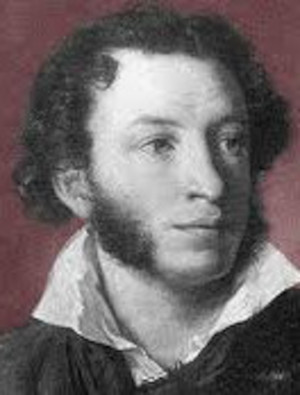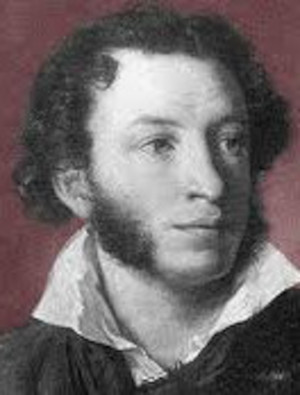


Alexander Pushkin (1799–1837) is considered one of the greatest Russian poets and the founder of modern Russian literature. His innovative use of language, mastery of various literary forms, and profound exploration of human emotions and societal issues made him a transformative figure in Russian culture. Pushkin is celebrated for his poetry, novels, plays, and short stories, and his works have had a lasting influence on Russian literature, inspiring generations of writers, including Fyodor Dostoevsky, Leo Tolstoy, and Anton Chekhov. He is often referred to as the "father of Russian literature."
Birth and Family Background: Alexander Sergeyevich Pushkin was born on June 6, 1799, in Moscow, Russia, into a noble but not particularly wealthy family. His father, Sergei Pushkin, belonged to the untitled Russian nobility, while his mother, Nadezhda Gannibal, was the granddaughter of an African man, Abram Gannibal, who had been brought to Russia as a slave but was adopted and educated by Peter the Great, becoming a prominent figure in Russian society. This African heritage played a role in shaping Pushkin’s identity, and he would later incorporate it into some of his writings.
Education: Pushkin grew up in a cultured household with access to French literature and language, which were dominant among Russian nobility at the time. His early education was influenced by private tutors, and at the age of 12, he was sent to the Imperial Lyceum at Tsarskoye Selo (near St. Petersburg), an elite school for the children of noble families. The Lyceum provided Pushkin with a strong foundation in literature, history, and languages, and it was during this period that he began writing poetry. His talent was recognized early on, and he quickly gained a reputation as a gifted poet.
Early Poetry: Pushkin’s first major poem, Ruslan and Ludmila (1820), a long narrative poem based on Russian folklore, established his literary reputation. The poem’s innovative use of language and blending of humor, fantasy, and adventure set it apart from the more traditional, formal Russian poetry of the time. Although it was controversial due to its deviation from established literary norms, Ruslan and Ludmila marked the beginning of Pushkin’s rise to prominence.
Exile and Political Views: Pushkin’s outspoken political views and criticism of the autocratic Russian government led to his being exiled several times during his career. His early poems, such as Ode to Liberty (1817), expressed liberal and anti-autocratic sentiments that were in line with the growing spirit of rebellion in Russia, particularly among the Decembrists, a group of revolutionaries who sought to overthrow the monarchy in 1825. Pushkin, while sympathetic to their cause, was not directly involved in the Decembrist Uprising, but his association with liberal ideas made him a target of government scrutiny.
In 1820, Pushkin was exiled to the Caucasus and Crimea, where he traveled extensively and wrote some of his most famous poems, including The Prisoner of the Caucasus and The Fountain of Bakhchisarai. His experiences during exile deepened his understanding of Russian society, nature, and history, which became central themes in his later works.
Maturity as a Writer: By the mid-1820s, Pushkin had developed a distinctive voice that combined classical Russian tradition with European Romanticism. His poems began to explore deeper philosophical and psychological themes, reflecting his growing maturity as a writer. His masterpiece, Eugene Onegin (1833), is a verse novel that tells the story of a disillusioned aristocrat, Eugene Onegin, and his tragic relationship with Tatyana, a country girl. The work is considered a cornerstone of Russian literature and is often hailed as one of the first great works of modern Russian fiction. Its exploration of love, fate, and the conflict between individual desires and social conventions resonated deeply with Russian readers and established Pushkin as a literary innovator.
Eugene Onegin (1825–1833): Eugene Onegin is Pushkin’s most famous and influential work. Written in a unique stanza form known as the "Onegin stanza," the novel in verse blends narrative fiction with lyrical poetry, social commentary, and philosophical reflections. The story centers on the titular character, a cynical and bored aristocrat, and his relationship with Tatyana, a young woman from a provincial family who falls in love with him. The novel explores themes of love, fate, alienation, and the emptiness of Russian aristocratic life. Its vivid portrayal of Russian society and the psychological complexity of its characters set a new standard for Russian literature.
Boris Godunov (1825): Boris Godunov is a historical drama based on the life of the Russian tsar Boris Godunov, who ruled in the late 16th century. The play explores themes of power, legitimacy, and political ambition, as well as the moral dilemmas faced by rulers. Although the play was initially censored by the authorities due to its portrayal of political intrigue, it later became a significant work in Russian drama and was adapted into an opera by composer Modest Mussorgsky.
The Bronze Horseman (1833): This narrative poem is one of Pushkin’s most celebrated works, and it deals with the conflict between the individual and the state. Set in St. Petersburg, it tells the story of a young man named Evgeny whose life is destroyed by a flood caused by the statue of Peter the Great, the "Bronze Horseman," which symbolizes the power and ambition of the Russian state. The poem is a powerful meditation on the costs of progress and the clash between human vulnerability and state power.
The Queen of Spades (1834): The Queen of Spades is one of Pushkin’s most famous short stories. It tells the story of Hermann, a German officer obsessed with learning the secret of winning at cards. The story is notable for its psychological depth, its exploration of obsession and fate, and its supernatural elements. It became a model for later Russian writers like Fyodor Dostoevsky and was adapted into an opera by Tchaikovsky.
The Captain’s Daughter (1836): This historical novel is set during the Pugachev Rebellion of 1773–1775, a major peasant uprising against the Russian Empire. The novel focuses on the experiences of Pyotr Grinyov, a young nobleman, during the rebellion, and it explores themes of honor, loyalty, and the harsh realities of life in imperial Russia. The Captain’s Daughter is often seen as a precursor to the great Russian historical novels of Tolstoy and Dostoevsky.
Romantic Life: Pushkin’s personal life was as turbulent as his literary career. He had numerous love affairs, and his passionate relationships often provided inspiration for his poetry. In 1831, Pushkin married Natalya Goncharova, a beautiful but much younger woman who became the subject of his intense affection and jealousy. Their marriage was stormy, and Pushkin’s relationship with Natalya played a central role in the events leading to his tragic death.
Dueling and Death: Pushkin’s life was cut short by a duel in 1837, which he fought to defend his wife’s honor. Pushkin had become involved in a conflict with Georges d’Anthès, a French officer rumored to be having an affair with Natalya. The duel took place on January 27, 1837, and Pushkin was mortally wounded. He died two days later, on January 29, 1837, at the age of 37.
His death shocked Russian society, and he was mourned as a national hero. Pushkin’s duel and untimely death have since become legendary, cementing his status as a romantic and tragic figure in Russian culture.
Father of Russian Literature: Pushkin is often hailed as the "father of Russian literature" because of his role in elevating the Russian language to a literary form capable of expressing the complexities of human experience. He broke away from the dominance of French and classical traditions in Russian literature, introducing a more natural and expressive style that resonated with Russian readers.
Influence on Russian Writers: Pushkin’s influence on Russian literature is immense. His works inspired the major Russian writers who followed him, including Fyodor Dostoevsky, Leo Tolstoy, Ivan Turgenev, and Anton Chekhov. Pushkin’s exploration of Russian history, folklore, and contemporary society helped create a distinctly Russian literary tradition that continues to be celebrated today.
Romanticism and Realism: Although Pushkin is often associated with Romanticism, his works display a deep psychological insight and realism that foreshadowed the great Russian novels of the 19th century. His ability to capture the emotional and intellectual conflicts of his characters, while also providing social and political commentary, laid the foundation for the later development of Russian Realism.
Cultural Legacy: Pushkin’s legacy extends beyond literature. His life and works have become deeply embedded in Russian culture, and his influence can be seen in Russian music, art, and theater. Numerous operas, ballets, and films have been based on his works, including Tchaikovsky’s opera Eugene Onegin and Mussorgsky’s Boris Godunov. Pushkin remains a symbol of Russian national identity and artistic achievement.
Alexander Pushkin’s contributions to Russian literature are unparalleled. As the father of modern Russian literature, his works broke new ground in exploring human emotions, social conflicts, and historical themes with a level of depth and artistry that set a standard for future generations. His legacy endures not only in his poetry and prose but also in the broader Russian cultural consciousness, where he is revered as one of the greatest literary figures in history. Pushkin’s works continue to inspire readers and writers around the world, ensuring his place as a giant in world literature.

We use cookies
We use cookies and other tracking technologies to improve your browsing experience on our website, to show you personalized content and targeted ads, to analyze our website traffic, and to understand where our visitors are coming from. Privacy Policy.